×
The Standard e-Paper
Kenya’s Boldest Voice

China's growing pessimism over relations with the United States has Beijing preparing for a war it would rather not fight, according to an assessment by a top U.S. defense intelligence official.
The head of the Defense Intelligence Agency (DIA) China Mission Group on Tuesday warned that the U.S. and China are likely entering an "increasingly confrontational period," with Beijing ever more willing to assert itself in multiple ways.







